GATE Study Planner Civil Engineering(CE)
Introduction
Hi Warriors,
Please find a comprehensive GATE Study Plan for your GATE exam 2022 preparation. The number of hours considered in this planner is 3 hours per day (on an average). You can adjust number of hours as per your convenience. For instance, if you see the Master planner below, you will find we need approx. 220-250 hours for completing Stage-I. So if we study 3 hours, on an average, for 90 days = 270 hours, we can easily cover what’s given in the document.
Note: This plan is designed in consideration with students who have got top 100 ranks in GATE or any national level exam in the past few years.
Similar plan is followed by many exam toppers and is highly recommended by most of The top faculties of the country. You will realize while going through it that a lot of research is gone In to make it helpful to you.
The following document contains:
- Master plan
- Flow of a subject which should be followed
- How to make notes
- How to do TestAnalysis
- How to do revision
- Subject wise( topic wise) time devotion plan
1.Master Plan
| Stage – I | Stage – II | Stage – III | Stage – IV | Stage – V | |
| Notes + Gate Ques + Topic Test + Subject Test | GA = 27 hrs
Maths = 44 hrs EM = 46 hrs FM = 69 hrs SOM = 68 hrs
|
Thermo = 79 hrs
Manufacturing = 77 hrs TOM = 64 hrs |
MD = 40 hrs
HT = 52 hrs IE = 59 hrs |
3 FLT | 3 FLT |
| Extra Workout | One Mock with Analysis = 7 hrs | 2 Mocks with Analysis = 15 hrs | 3 Mocks | 3 Mocks | |
| Revise all 8 Subjects = 130 hrs | Revise all Subjects = 120 hrs | Revision 2 | Revision 3 | ||
| Total Hours | 254 | 357 | 286 | 125 | 140 |
2. Flow of Studies for Any subject:
- Subject/Topic wise Notes
- GATE Questions for past 10 Years (Topic Wise)
- Topic wise test on aspiration.ai
- Subject Tests on aspiration.ai
- Extra Practice Questions + Subject wise Revision
3.How to Make Notes:
- If you attend lectures of any faculty through GATEFLIX then you can easily make notes. If you haven’t done so, go to online videos to do so. You may also go to Youtube:- Khan academy, Nptel or the latest and most popular are Gateflix videos.
- Make notes neatly as they will be very very useful while revision in the last 30 days. Use 3 colour pen to indicate important, very important and very very important concepts.
- Make a separate handbook for formulas. In exams 40% questions are direct formula based or implied formula based. Problem with students is that they tend to mix up formula. If you have this handbook of formula ready and have revised the things at least 2 times , I can guarantee you the 40 % marks.
- Don’t Xerox someone’s notes because the moment you write yourself then you can memorize the concept for a longer duration.
- Leave one page Space after 2/3 pages or after every major chapter. This is to ensure that if you come across any vital formula or Information or short trick while referring tests or reference book later then you may place That information in these spaces.
4.How to do a Test Analysis:
- Any test( Online or offline) need to taken in time frame.There is No point in taking the test without a time Limit.
- Don’t take any test without revision of Notes of the syllabus covered in the test. It will be a wastage if You just randomly take a test.
- Once the test time is over, don’t jump to answer Solution . Check the answer key and get To Know your score.
- Now follow a 3 stage process .
Stage 1: Go to the right ones and check whether you were confident of answering that question . If the answer is “yes” check the solution given in order to see which method was better( yours or the given in Book or online portal ). Adopt the best you like.
Stage 2: Go to questions which you got wrong. Try to fight with the question that why you got it wrong without looking at the solution yet. Try 3 or 4 times by re-reading the question or even refer notes. Maximum time it’s a silly mistake. These silly Mistakes can’t be zeroed but can be reduced by practicing more .Refer notes again if needed. In case you are still not able to click after a lot of Slumber, try to open the solution and check your mistake. If it was a new concept to you, add in the void space you have kept in your notes. This will help to solve similar question again.
Stage 3: Now the turn of questions which are unattempted.This could be due to
- Not knowing The concept or due to lack of time. If it was conceptual ignorance , go to your faculty ( many online live class teachers are available , In case you don’t have one)and learn the concept.
- It was a lack of time issue try now and solve it. If you are taking a lot of Time, try to memorize few steps so that if it appears in exam you will be able to do it fast. Other students might leave such question in exam , But you will probably dare to attempt such and score more.
- The key to successs in any entrance exam is solve More , analyse more. In each subject you should Solve almost 1000+ questions including past year Actual Exam questions, topic wise test, subject test and mock tests.
5. How To do Revision:
- Well this is dependent on the way you have prepared notes and how effectively have you done the Test Analysis.
- Go through the whole cycle again in this revision phase like NOTES >- GATE QUESTIONS >- Topic test >- Subject Test >- Extra questions (if any ).
- While Revising, don’t solve Each and every question from notes or tests. Try To randomly pick 20 questions from different pages or test( purely random) . If you are able to recall the logic of 16+ then you are good to go ahead. If you are Not able to solve more than 10 questions then it’s a re revision time. Follow step 2.
- Try to have a bird eye view and See topics on which questions Are asked again and Again. Star mark them for making revision 2 and revision 3 effective.
6.SUBJECT WISE PLAN:
A detailed GATE Study Plan is given below, which carries subject wise in-depth action plan. In this GATE Study Planner, you will find:
- No of days and hours required to complete particular topics of particular subjects,
- No of times questions have been asked in GATE Exam for the last 10 years with the weightage of those questions.
a. General Aptitude
| Chapter 1 | Numerical Ability | Numerical computation, numerical estimation, numerical reasoning, data interpretation | 4 days |
| Chapter 2 | Verbal Ability | English grammar, sentence completion, verbal analogies, word groups, instructions, critical reasoning and verbal deductions | 2 days |

- Column 1 represents Time to study and make notes + Solving GATE Questions of that topic .
- The last 10 columns represent year wise number questions( marks in Bracket ).
|
GA
|
Hours | Remarks | |
| Notes + Gate Questions | 22 | ||
| Topic test from Aspiration.ai | 3 | with Analysis | |
| Subject test from aspiration.ai | 2 | with Analysis | |
| revision overall | 2 | ||
| Total | 29hrs |
b. Engineering Maths
A detailed GATE Study Plan is given below, which carries subject wise in-depth action plan. In this GATE Study Planner, you will find:
- No of days and hours required to complete particular topics of particular subjects,
- No of times questions have been asked in GATE Exam for the last 10 years with the weightage of those questions.
| Chapter 1 | Linear Algebra | Matrix Algebra, Type of matrices, Determinant, Cramer’s rule, Systems of linear equations, Rank of the equation, consistency of the equation, Eigen values and Eigen vectors. | 2 day |
| Chapter 2 | Probability & distribution | Sampling theorems, Conditional probability, Baye’s theorem, Random variables, Expectation & Variance, Discrete and continuous distributions, uniform, normal, exponential, Poisson, Binomial. Correlation and regression analysis, covariance, correlation coefficient, Mean, median, mode and standard deviation, | 1 day |
| Chapter 3 | Numerical methods | Solutions of non-linear algebraic equations, Newton Raphson method, Regulafalsi method or (method of false position), secant method, Gauss Elimination Method, Gauss Jordon method, Jacobi iteration method , Gauss Siedel iteration method, Numerical Integration: Trapezoidal rule, Simpson’s 1/3 & 3/8 rule, single and multi-step methods for differential equations, Euler’s method, RungeKutta Method | 1 day |
| Chapter 4 | Calculus | Limits & continuity, Basic differentiation & integration, Mean value theorems, Theorems of integral calculus, Evaluation of definite and improper integrals, Partial Derivatives, Maxima and minima, Multiple integrals, Vector identities, Directional derivatives, Line, Surface and Volume integrals, Stokes, Gauss and Green’s theorems. | 3 days |
| Chapter 5 | Differential Equations | First order equation (linear and nonlinear), Higher order linear differential equations with constant coefficients, Method of variation of parameters, Cauchy’s and Euler’s equations, Initial and boundary value problems, Partial Differential Equations and variable separable method. | 2 days |
| Chapter 6 | Complex Variables | Analytic functions, Cauchy’s integral theorem and integral formula, Taylor’s and Laurent series, Residue theorem | 1 day |
| Chapter 7 | Laplace Transforms+ Fourier series | Definition & property of Laplace transform + Fourier Series | 0.5 day |
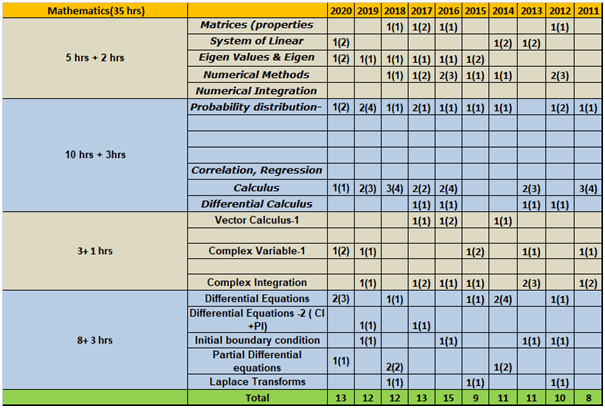
- Column 1 represents Time to study and make notes + Solving GATE Questions of that topic .
- The last 10 columns represent year wise number questions( marks in Bracket ).
|
Maths Master Plan
|
Hours | Remarks | |
| Notes + Gate Questions | 35 | ||
| Topic test from Aspiration.ai | 5 | with Analysis | |
| Subject test from aspiration.ai | 4 | with Analysis | |
| revision overall | 6 | ||
| Total | 50 hrs |
c. Engineering Mechanics
A detailed GATE Study Plan is given below, which carries subject wise in-depth action plan. In this GATE Study Planner, you will find:
- No of days and hours required to complete particular topics of particular subjects,
- No of times questions have been asked in GATE Exam for the last 10 years with the weightage of those questions.
| Chapter 1 | Force and moment systems | Force and moment systems | 1 day |
| Chapter 2 | Equilibrium of force systems | Equilibrium of force systems | 2 days |
| Chapter 3 | Structural analysis | Structural analysis | 2 days |
| Chapter 4 | Kinematics and dynamics of particles and rigid bodies in plane motion | Kinematics and dynamics of particles and rigid bodies in plane motion | 2 days |
| Chapter 5 | Friction | Friction | 1 day |
| Chapter 6 | Work and energy principle | Work and energy principle | 1 day |
| Chapter 7 | Impulse and momentum | Impulse and momentum | 1 day |
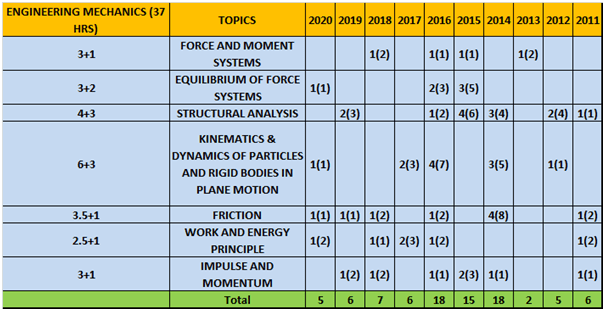
- Column 1 represents Time to study and make notes + Solving GATE Questions of that topic .
- The last 10 columns represent year wise number questions( marks in Bracket ).
|
EM
|
Hours | Remarks | |
| Notes + Gate Questions | 37 | ||
| Topic test from Aspiration.ai | 5 | with Analysis | |
| Subject test from aspiration.ai | 4 | with Analysis | |
| revision overall | 7 | ||
| Total | 53 hrs |
d. Strength of Materials
A detailed GATE Study Plan is given below, which carries subject wise in-depth action plan. In this GATE Study Planner, you will find:
- No of days and hours required to complete particular topics of particular subjects,
- No of times questions have been asked in GATE Exam for the last 10 years with the weightage of those questions.
| Chapter 1 | Simple stress and strain | Types of stresses and strains, types of materials,
thermal stress |
2 days |
| Chapter 2 | Strain energy and impact load | Strain energy | 2 days |
| Chapter 3 | Shear force and bending
moment diagram |
Shear force, beam, FBD, method of analysis, equation of
equilibrium |
2 days |
| Chapter 4 | Bending stress and shear
stress |
Pure bending moment, direct shear stress | 2 days |
| Chapter 5 | Pure torsion | Pure torsion, composite shafts, springs | 2 days |
| Chapter 6 | Combined stress and strain | Different stress and strains, combined stress and strain | 3 days |
| Chapter 7 | Column and pressure level | Types of column, slenderness ratio, pressure level | 2 days |
| Chapter 8 | Slope and deflection | General expressions, methods | 2 days |
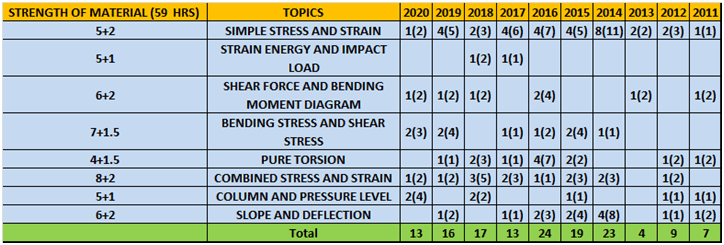
- Column 1 represents Time to study and make notes + Solving GATE Questions of that topic .
- The last 10 columns represent year wise number questions( marks in Bracket ).
|
SOM |
Hours | Remarks | |
| Notes + Gate Questions | 59 | ||
| Topic test from Aspiration.ai | 3 | with Analysis | |
| Subject test from aspiration.ai | 3 | with Analysis | |
| revision overall | 6 | ||
| Total | 71 hrs |
e. Fluid Mechanics
A detailed GATE Study Plan is given below, which carries subject wise in-depth action plan. In this GATE Study Planner, you will find:
- No of days and hours required to complete particular topics of particular subjects,
- No of times questions have been asked in GATE Exam for the last 10 years with the weightage of those questions.
| Chapter 1 | Basics of fluid mechanics | Definition of fluids, basic equations |
2 days |
| Chapter 2 | Properties of fluids | Density, specific gravity, viscosity, surface tension, capillarity, bulk modulus, vapour pressure |
1 day |
| Chapter 3 | Pressure and fluid statics | Pressure, barometer, atmospheric pressure, principle, pressure measurement, buoyancy and floatation |
2 days |
| Chapter 4 | Kinematics | Introduction, description, types of fluid flow, continuity equation, motion of fluid element, flow patterns, stream function |
3 days |
| Chapter 5 | Bernoulli’s equations and its applications | Euler’s equation, bernoulli’s equation and its applications |
2 days |
| Chapter 6 | Dynamics of fluid flow | Introduction, impulse momentum principle, forces exerted by fluids |
2 days |
| Chapter 7 | Flow through conduits/pipes | Internal, laminar, turbulent flow, loss of energy, flow through pipes and nozzles |
2 days |
| Chapter 8 | External flow | Boundary layers, drag force, boundary conditions |
2 days |
| Chapter 9 | Hydraulic turbines | Classification, various types of turbines, model testing |
2 days |
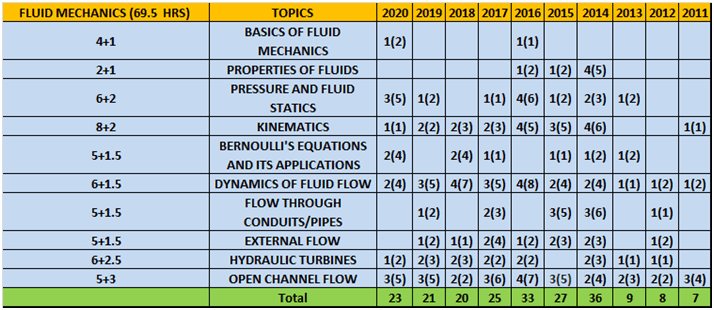
- Column 1 represents Time to study and make notes + Solving GATE Questions of that topic .
- The last 10 columns represent year wise number questions( marks in Bracket ).
|
FM |
Hours | Remarks | |
| Notes + Gate Questions | 70 | ||
| Topic test from Aspiration.ai | 3 | with Analysis | |
| Subject test from aspiration.ai | 4 | with Analysis | |
| revision overall | 8 | ||
| Total | 85 hrs |
f. RCC & Steel Structure
A detailed GATE Study Plan is given below, which carries subject wise in-depth action plan. In this GATE Study Planner, you will find:
- No of days and hours required to complete particular topics of particular subjects,
- No of times questions have been asked in GATE Exam for the last 10 years with the weightage of those questions.
| Chapter 1 | Basics | Plainandreinforcedconcrete, compressive strength, flexuralstrength,
tensile strength, stress-strain curve, |
12 days |
| Chapter 2 | Design of RCC structures | Limit state method,
characteristic strength of method, characteristic load, working stressmethod, permissible stresses |
|
| Chapter 3 | Concrete technology | Chemical composition of raw materials,
type of cements, admixture, aggregates, concrete, proportional concrete |
|
| Chapter 4 | Reinforced section | Balanced,
under reinforced and over reinforcedsection,momentof resistancecalculation, doubly reinforced section, flanged beam, IScodespecification, shearstress, designsteps, bond and anchorage, torsion. |
|
| Chapter 5 | Beam column | Design of beam and slab, IS 456 provisions,
one-way and two way slabs, clause 39.5 and 39.6, depth of foundation. |
|
| Chapter 6 | Basic element of prestress concrete | Lossofprestressduetofriction, anchorageslip,
creep of concrete, shrinkage concrete, deflection of restressed beam |
12 days |
| Chapter 7 | General design specification | Method of design, loads and forces, load combinations,
geometrical properties, riveted connection, bolted connection, types ofjoints, block shear strength, |
| welding, fillet weld | |||
| Chapter 8 | Design of tension members | Tension members,
design strength due to yielding of gross section, rapture of critical section and block shear |
|
| Chapter 9 | Design of compression members | Slenderness ratio,
designofcompressionmembers, battens, design of slab base |
|
| Chapter 10 | Design of beams | Design procedure, webbucklingstrength,
web cripping |
|
| Chapter 11 | Plastic analysis | Fully plastic moment of a section, shape factor,
load factor, basic theorems |
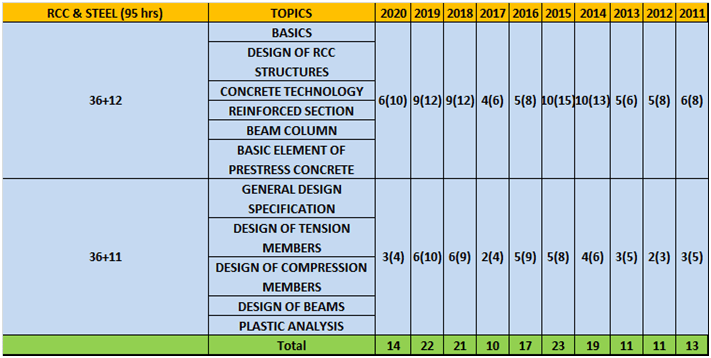
- Column 1 represents Time to study and make notes + Solving GATE Questions of that topic .
- The last 10 columns represent year wise number questions( marks in Bracket ).
|
RCC &steel Master Plan |
Hours | Remarks | |
| Notes + Gate Questions | 95 | ||
| Topic test from Aspiration.ai | 3 | with Analysis | |
| Subject test from aspiration.ai | 3 | with Analysis | |
| revision overall | 8 | ||
| Total | 109 hrs |
g. Structural Analysis
A detailed GATE Study Plan is given below, which carries subject wise in-depth action plan. In this GATE Study Planner, you will find:
- No of days and hours required to complete particular topics of particular subjects,
- No of times questions have been asked in GATE Exam for the last 10 years with the weightage of those questions.
| Chapter 1 | Static indeterminacy &kinematic indeterminacy | Structure analysis, structuralstability, supportreactions, equation of static equilibrium, kinematic indeterminacy |
14 days |
| Chapter 2 | Analysis of truss | Method of analysis, zero force members, truss with internal hinge | |
| Chapter 3 | Arch | Types of arches, advantages of arch, two and three hinged arches | |
| Chapter 4 | Influence line diagram | Sign convention, maximum SF and BM values due to moving loads, uniformly distributed load longer and smaller than the span | |
| Chapter 5 | Moment distribution method | Basic concept, sign convention, stiffness, distribution factor, carry over factor | |
| Chapter 6 | Slope deflection method | Fundamentals, sign convention, equilibrium equation, analysis steps | |
| Chapter 7 | Methods of structure analysis | Force method, displacement method | |
| Chapter 8 | Matrix method of analysis | Definition, types of matrix, properties of determinants, basic matrix operations, development of flexibility and stiffness matrix |
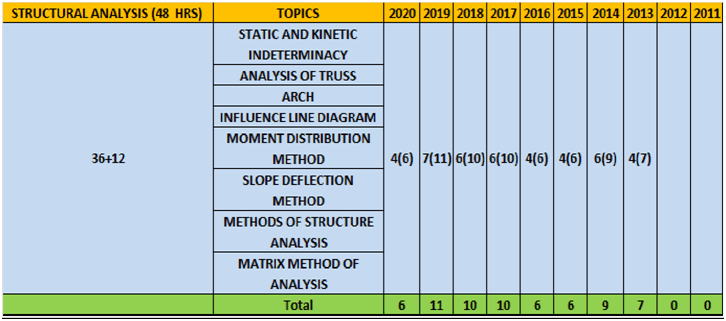
- Column 1 represents Time to study and make notes + Solving GATE Questions of that topic .
- The last 10 columns represent year wise number questions( marks in Bracket ).
|
SA Master Plan |
Hours | Remarks | |
| Notes + Gate Questions | 48 | ||
| Topic test from Aspiration.ai | 3 | with Analysis | |
| Subject test from aspiration.ai | 3 | with Analysis | |
| revision overall | 8 | ||
| Total | 62 hrs |
h. Water Resource Engineering
A detailed GATE Study Plan is given below, which carries subject wise in-depth action plan. In this GATE Study Planner, you will find:
- No of days and hours required to complete particular topics of particular subjects,
- No of times questions have been asked in GATE Exam for the last 10 years with the weightage of those questions.
| Chapter 1 | Hydrology | Hydrologic cycle, precipitation, evaporation, evapo-transpiration, watershed, infiltration, unit hydrographs, hydrograph analysis, floodestimationandrouting, reservoircapacity, reservoir and channel routing, surface run-off models, ground water hydrology – steady state well hydraulics and aquifers;Application of Darcy’s law. |
| Chapter 2 | Irrigation | Duty, delta, estimation of evapotranspiration; Crop water requirements; Design of lined and unlined canals, head works, gravitydamsandspillways; Designofweirsonpermeablefoundation; Typesofirrigationsystems, irrigation methods; Waterlogginganddrainage; Canal regulatory works, cross-drainagestructures, outlets and escapes. |
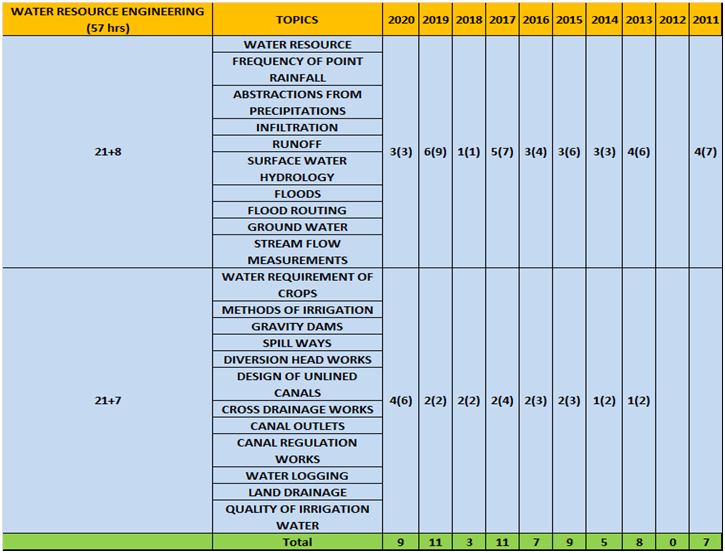
- Column 1 represents Time to study and make notes + Solving GATE Questions of that topic .
- The last 10 columns represent year wise number questions( marks in Bracket ).
|
WRE |
Hours | Remarks | |
| Notes + Gate Questions | 57 | ||
| Topic test from Aspiration.ai | 3 | with Analysis | |
| Subject test from aspiration.ai | 3 | with Analysis | |
| revision overall | 8 | ||
| Total | 71 hrs |
i. Transportation Engineering
A detailed GATE Study Plan is given below, which carries subject wise in-depth action plan. In this GATE Study Planner, you will find:
- No of days and hours required to complete particular topics of particular subjects,
- No of times questions have been asked in GATE Exam for the last 10 years with the weightage of those questions.
| Chapter 1 | Transportation Infrastructure | Highway alignment and engineering surveys; Geometric design of highways – cross-sectional elements, sight distances, horizontal and vertical alignments |
2.5 day |
| Chapter 2 | Traffic Engineering | Traffic studies on flow, speed, travel time – delay and O-D study, PCU, peak hour factor, parking study, accident study and analysis, statistical analysi softr afficdata; Microscopicandmacroscopicparametersoftrafficflow, fundamentalrelationships;Control devices,signal design by Webster’s method;Types of intersections and channelization;Highway capacity and level of service of rural highways and urban roads. |
3 Day |
| Chapter 3 | Highway Pavements | Highwaymaterials-desirablepropertiesandquality controltests;
Design of bituminous paving mixes; Designfactorsforflexibleandrigidpavements; DesignofflexiblepavementusingIRC:37-2012; Design of rigid pavements using IRC: 58-2011; Distresses in concrete pavements. |
4 day |
| Chapter 4 | Airport and Railway transportation | Geometric design of railway track and Airport runway length,
taxiway and exit taxiway design. |
1.5 day |

- Column 1 represents Time to study and make notes + Solving GATE Questions of that topic .
- The last 10 columns represent year wise number questions( marks in Bracket ).
|
MD Master Plan
|
Hours | Remarks | |
| Notes + Gate Questions | 50 | ||
| Topic test from Aspiration.ai | 6 | with Analysis | |
| Subject test from aspiration.ai | 5 | with Analysis | |
| revision overall | 4 | ||
| Total | 65 hrs |
j. Heat Transfer
A detailed GATE Study Plan is given below, which carries subject wise in-depth action plan. In this GATE Study Planner, you will find:
- No of days and hours required to complete particular topics of particular subjects,
- No of times questions have been asked in GATE Exam for the last 10 years with the weightage of those questions.
| Chapter 1 | Introduction to modes of heat transfer
|
Conduction, convection, thermal radiation | 1 day |
| Chapter 2 | Introduction to conduction
|
One dimensional heat conduction in plane walls, cylinders, electrical analogy, fins, unsteady heat conduction
|
1 day |
| Chapter 3 | One dimensional steady state conduction without heat generation
|
One dimensional steady state conduction without heat generation
|
1 day |
| Chapter 4 | One dimensional steady state conduction with heat generation
|
One dimensional steady state conduction with heat generation
|
1 day |
| Chapter 5 | Extended surface
|
Temperature distribution of infinite long fin | 1 day |
| Chapter 6 | Transient heat conduction
|
Temperature profile with time.
|
1 day |
| Chapter 7 | Radiation
|
Radiative heat transfer, black and grey surfaces, shape factors, network analysis
|
`2 days |
| Chapter 8 | Convection | Dimensionless parameters in free and forced convective heat transfer , various
correlations for heat transfer in flow over flat plates and through pipes; thermal boundary layer; effect of turbulence |
1 day |
| Chapter 9 | Natural convection | 1 day | |
| Chapter 10 | Heat exchangers | Mean effective temperature in parallel flow heat exchanger, mean effective temperature in counter flow heat exchanger, NTU method | 2 days |
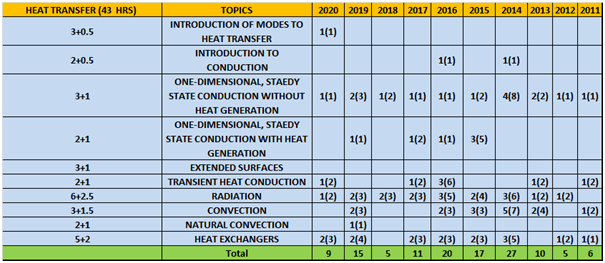
- Column 1 represents Time to study and make notes + Solving GATE Questions of that topic .
- The last 10 columns represent year wise number questions( marks in Bracket ).
|
HT Master Plan
|
Hours | Remarks | |
| Notes + Gate Questions | 43 | ||
| Topic test from Aspiration.ai | 5 | with Analysis | |
| Subject test from aspiration.ai | 4 | with Analysis | |
| revision overall | 5 | ||
| Total | 57 hrs |
k. Industrial Engineering
A detailed GATE Study Plan is given below, which carries subject wise in-depth action plan. In this GATE Study Planner, you will find:
- No of days and hours required to complete particular topics of particular subjects,
- No of times questions have been asked in GATE Exam for the last 10 years with the weightage of those questions.
| Chapter 1 | Forecasting
|
Forecasting types, errors and categories of methods | 1 day |
| Chapter 2 | Inventory control
|
Inventory control, models, economic order quantity | 2 days |
| Chapter 3 | Project management
|
CPM & PERT | 2 days |
| Chapter 4 | Plant layout
|
Production system | 1 day |
| Chapter 5 | Line balancing
|
Important definitions and parameters | 2 days |
| Chapter 6 | Sequencing model
|
Gantt chart | 1 day |
| Chapter 7 | Queuing theory
|
Kendell notations, operating characteristics | 2 days |
| Chapter 8 | Linear programming problem | Definition and solution of programming problems | 2 days |
| Chapter 9 | Assignment model | Solution method, solving algorithm | 1 days |

- Column 1 represents Time to study and make notes + Solving GATE Questions of that topic .
- The last 10 columns represent year wise number questions( marks in Bracket ).
|
IE Master Plan
|
Hours | Remarks | |
| Notes + Gate Questions | 51 | ||
| Topic test from Aspiration.ai | 4 | with Analysis | |
| Subject test from aspiration.ai | 4 | with Analysis | |
| revision overall | 5 | ||
| Total | 64 hrs |